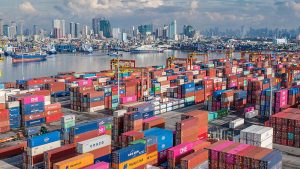THE PHILIPPINES’ current account deficit could further widen over the medium term as global trade uncertainties affect external demand, Fitch Solutions unit BMI said.
“We now expect the Philippines’ external position to deteriorate as trade fragmentation and its knock-on effects on global demand will weigh heavily on exports,” it said in a report.
BMI expects the current account deficit to average -2.8% of gross domestic product (GDP) over the next three years. This is wider than the -0.4% average during the 2015-2019 period.
It sees the current account gap to settle at -3% of GDP this year, before narrowing to -2.8% in 2026, -2.6% in 2027, and -2.3% in 2028.
Data from the Bangko Sentral ng Pilipinas (BPS) showed the current account deficit widened to -3.7% of GDP in the first quarter, versus -1.9% in the same period in 2024. The BSP expects the current account deficit to be -3.3% this year, and -2.5% in 2026.
BMI said the outlook is “hardly surprising” as key trading partners such as the US and China are facing more challenges, which could dampen demand for Philippine exports.
The US is projected to grow by 1.7% this year, slowing from 2.8% in 2024, while China GDP is forecast to ease to 4.8% this year from 5% in 2024.
“Beyond the two economic giants, the global trade landscape is clouded by a rise in US tariffs, which we think will impact the global economy more negatively in the coming years,” BMI said.
The US started implementing higher tariffs on most of its trading partners earlier this month, with Philippine goods now subject to a 19% tariff.
In June, the US was the top destination for Philippine-made goods with $1.22 billion (17.3% share). It was closely followed by Hong Kong ($1.065 billion or 15.2% share), Japan ($974.8 million or 13.9% share), and China ($733.99 million or 10.5% share).
BMI said weak global demand could likewise hit services exports, particularly the business process outsourcing (BPO) industry.
“The Philippines is a major player in global BPO, holding 15% of global market share and contributing 7.5% to domestic GDP. This makes it highly exposed to a weak global services environment,” it said.
Remittances are also expected to slow as growth is linked to economic conditions in key source countries such as the US, Singapore, Saudi Arabia, Japan and the United Kingdom, BMI said.
Meanwhile, Moody’s Ratings said the recently implemented US tariffs could pull down economic and investment growth in Asia.
“The tariffs have left countries across Europe and APAC (Asia-Pacific) feeling bruised because the US is the largest trading partner for a majority of them, and a decline in sales to their largest customer will hurt,” the credit rater said.
Despite this, Moody’s noted that a recession remains unlikely.
“We expect global growth to slow, but we don’t appear to be staring down the barrel of a recession,” it said. — Katherine K. Chan
